Are Service Academies Still Useful?
Naval Academy English prof Bruce Fleming has a scathing op-ed in the NYT titled “The Academies March Toward Mediocrity.”
First, he argues that the very idea of the Academies is dated:
[T]he Naval Academy, where I have been a professor for 23 years, has lost its way. The same is true of the other service academies. They are a net loss to the taxpayers who finance them, as well as a huge disappointment to their students, who come expecting reality to match reputation. They need to be fixed or abolished.
The service academies are holdovers from the 19th century, when they were virtually the only avenue for producing an officer corps for the nation’s military and when such top-down institutions were taken for granted. But the world has changed, which the academies don’t seem to have noticed, or to have drawn any conclusions from.
With the rise after World War II of the Reserve Officer Training Corps programs at universities around the country, the academies now produce 20 percent or less of the officers in each service, at an average cost to taxpayers of nearly half a million dollars per student, more than four times what an R.O.T.C.-trained officer costs.
The institutions are set on doing things their own way, yet I know of nobody in the Navy or other services who would argue that graduates of Annapolis or West Point are, as a group, better than those who become officers through other programs. A student can go to a civilian school like Vanderbilt, major in art history (which we don’t offer), have the usual college social experience and nightlife (which we forbid), be commissioned through R.O.T.C. — and apparently be just as good an officer as a Naval Academy product.
He makes several observations along these lines that ring true although, ironically, because they were true when I was a cadet at West Point from 1984 to 1986. Which is to say, since before Fleming was teaching at Annapolis.
Margaret Soltan, who pointed me to the piece, not surprisingly, glommed on to Fleming’s argument against Big Time Sports at the Academies.
Meanwhile, the academy’s former pursuit of excellence seems to have been pushed aside by the all-consuming desire to beat Notre Dame at football (as Navy did last year). To keep our teams in the top divisions of the National Collegiate Athletic Association, we fill officer-candidate slots with students who have been recruited primarily for their skills at big-time sports. That means we reject candidates with much higher predictors of military success (and, yes, athletic skills that are more pertinent to military service) in favor of players who, according to many midshipmen who speak candidly to me, often have little commitment to the military itself.
This is likely true, although we’re talking about a relative handful of slots, since football and basketball are the only sports where there’s much incentive to lower academic and conduct standards for recruiting. And there’s only so far one can go with that, since the 5-year service commitment tends to drive away true Blue Chip players with an eye on the pros.
This likely won’t win Fleming any friends:
Another program that is placing strain on the academies is an unofficial affirmative-action preference in admissions. While we can debate the merits of universities making diversity a priority in deciding which students to admit, how can one defend the use of race as a factor at taxpayer-financed academies — especially those whose purpose is to defend the Constitution? Yet, as I can confirm from the years I spent on the admissions board in 2002 and ’03 and from my conversations with more recent board members, if an applicant identifies himself or herself as non-white, the bar for qualification immediately drops.
But, again, to the extent this is a meaningful impact on the quality of the class, it’s a problem that predates Fleming’s tenure.
And if students struggle academically when they get to the academy, our goal is to get them to graduate at whatever cost. Thus we now offer plenty of low-track and remedial courses, and students who fail can often just retake classes until they pass: we have control over their summers and their schedules, and can simply drag them through with tutoring.
I’ve taught low-track English classes; the pace is slower and the papers shorter than in my usual seminars, but the students who complete them get the same credit. When I’ve complained about this, some administrators and midshipmen have argued that academics are irrelevant to being an officer, anyway. Really? Thinking and articulating are irrelevant to being an officer?
This was the case 25 years ago, too. At the time, the remediation tended to focus on the Rock Math class designed to get people up to snuff for what was, in its inception, an Engineering school. But that was changing even during my time there and, by the late 1980s, largely done, with West Point, at least, turning to a more standard curriculum. (I suspect Navy and, especially, Air Force have remained more math intensive given the greater technical demands of officership in those Services.)
We have two choices. One is to shut down Annapolis, West Point and the other academies, and to rely on R.O.T.C. to provide officers. Or we can embrace the level of excellence we once had and have largely abandoned. This means a single set of high standards for all students in admissions, discipline and academics. If that means downgrading our football team to Division III, so be it.
I’ve long advocated having the Academies join the Ivy League or otherwise getting out of the Big Time Sports racket. In addition to Fleming’s rationale, it just always seemed silly to face three choices at Division I-A: 1) Lower standards so as to be mediocre at best, 2) Lose a lot, 3) Rejoice in victories over patsies and I-AA schools. By joining an academic-intensive league, the competition would be among peers and every game would be more akin to the rivalry games between the Academies themselves.
As to the larger question of whether the Academies still serve a purpose, it’s hard to make a purely rational argument. There’s no statistical evidence of which I’m aware that Academy grads make better officers or even make careers at a higher rate. And, indeed, as Fleming notes, the Academies’ inability to, as a colleague of mine put it, differentiate “discipline from chickenshit” tends to produce cynics. All that remains, then, is the history, pageantry, and camaraderie that connection to the Long Gray Line and its sister equivalents brings. And I’m not sure that’s enough.
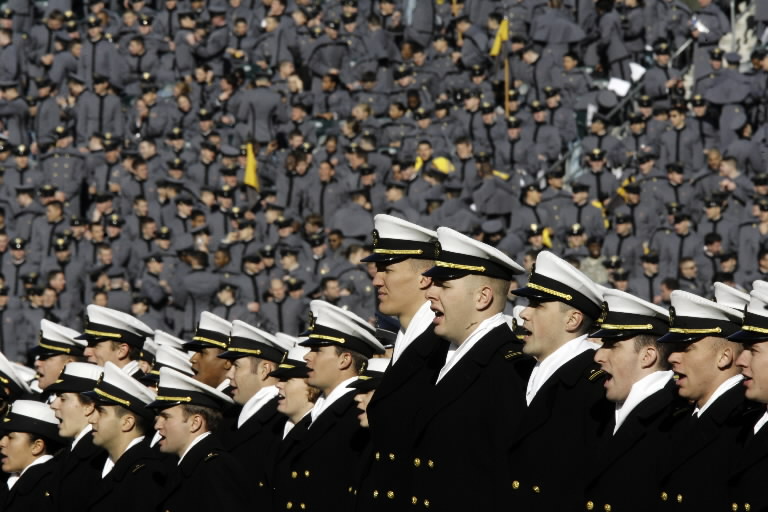

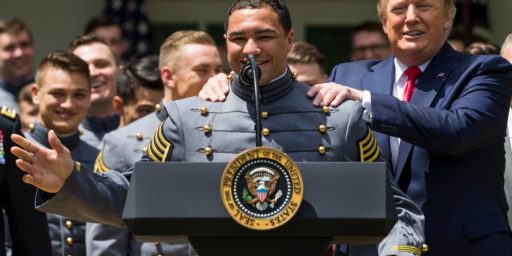
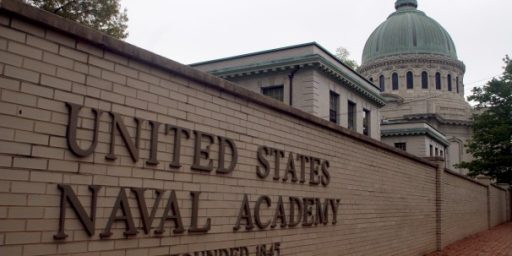
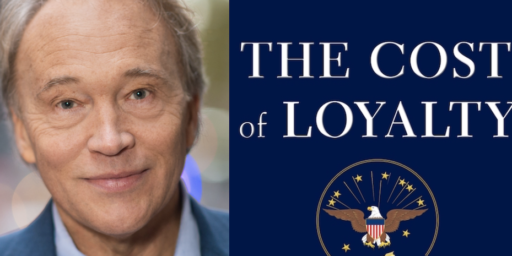
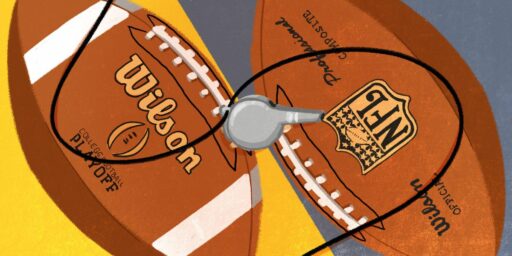

I agree that the Officers they produce on average are not any greater than other programs. However just like OCS and ROTC they do tend to be a certain unique general perspective to the job. Understanding of course it all comes down to the individual. I am a big believer in versatility. I would be open to changes in the programs but I am not willing to throw away the academies.
I’d make a run at the Merchant Marine Academy first. See if you can get anywhere. Plenty of state academies that compete and the job market is thin. I doubt it goes though.
Ricks ran a series on this issue. Our return on investment is pretty poor from the academies. We should retain them only if they make a sincere effort to return to excellence. I would give them a ten year time horizon. If they fail, abolish them, but give those coming from ROTC and other sources a bit longer formal training in an academy like setting.
Steve
I spent 6 years on active duty with the Marines, and another 5 as a virtually full time reservist.
I was a public university 90 day OCS wonder, after that I went to Marine Basic School and NAS Pensacola for flight training. From that point on I was around service academy graduates from all the academies on a constant basis.
Later during my career as a major airline Captain, I had many more academy grads in the cockpit with me.
Some of the Academy “Pukes/Ring Knockers” could be irritating as hell from time to time.
But in all honesty,I have to say based on 30 plus years of working with and for them. They are as a class superb military officers, and in general of noticeably higher quality,than most of their non academy peers.
i am still an active duty officer who sees everyone from OCS to ROTC to West Point grads and in my non-scientific study i have to say that the West Point grads as a whole are a cut above – I am a ROTC grad myself – the problem with ROTC and OCS is that they will let damn near any idiot graduate b/c they are so short on officers. Anyone who can take the rigorous academics and all of the other things that go with West Point that require endless time management and long days is still almost always a cut above the ROTC folks. Don’t get me wrong, I have seen people graduate from ROTC, OCS, and West Point that could do well on wall street, be a rhodes scholar – and I have seen the other side where I see people who would have difficulty as a greeter at wall mart. But overall, the west pointers are still a cut above the average ROTC grad esp the ROTC grad who is barely graduated from PODUNK Univ with a 1.1 GPA and majored in parks and leisure (and yes I have met quite a few with this resume).
@highlander
Didn’t you tell us that you commanded an infantry company in Nam?
Didn’t you tell us that you commanded an infantry company in Nam?
Sam,
No. I said I had commanded a platoon. An ANGLICO platoon to be exact.
All Marine pilots are expected to serve with Marine Infantry units when needed.
That experience, is just one more reason we excell at the close air support of our fellow Marines. You should give it a try…those were some of the very best years of my life.
Fleming’s at it again.
As a USNA grad, I have no input to the discussion regarding quality of officers from different commissioning sources. People are people, and anecdotal evidence isn’t a sufficient rationale to retain service academies.
Being undeniably liberal and undeniably smug, Fleming tends to be unpopular with the brass and midshipmen alike. Unfortunately, he’s 100% right– everything he claims about our admissions policies, double standards, and visibly lowering standards is 100% true. He’s often dismissed as a noisemaker, but he should be listened to. Since abolishing the service academies is not a realistic option, returning to standards and mission is the only option. The American people deserve more.
I was in the Corps 1958-1962.
Bruce Fleming’s argument is fatally flawed in so many ways it’s almost too easy to pick apart his arguments as invalid.
First off, he should really provide some empirical data when trying to sell the idea that Academies are no longer relevant and useful. Otherwise he just appears to be an opinionated complainer of the lowered standards he’s noticed at Annapolis. His argument holds no water unless he actually provides some evidence that Academy grads are not any better than ROTC grads. As a professor he should know better than to provide a simple opinion and not provide any proof. That’s what professors teach their students to do. He should do it himself.
His logic is also unusually concentrated on the athletics of the Academies. Since when is the performance of a schools athletes the justification of its existence? I agree that athletes should be held to the same standard as the other midshipmen and cadets but he shouldn’t place so much emphasis on athletics success as it has NOTHING to do with the other 90% of the Academy experience.
He also incorrectly uses both sides of an argument to try to sell his idea of shutting down the Academies. He first says that ROTC students can major in non-engineering majors and still produce officers that are just as good as Academy grads. Then he goes on to say that the Academies have moved away from their engineering roots (which they intentionally have) and they are the worse for it? Which one is it Fleming?
He also does not know Academy history as well as he should. Here are the facts. West Point began in 1802. Annapolis in 1845. Air Force in 1954. Don’t argue that the Academies are holdovers from the 1800’s when one Academy started half way through the century and another one didn’t start until 54 years after the century you reference ended. That’s just bad math!
One last note about this: all Academies saw steady increases in their student body during the 1900’s because of Congresses understanding that more officers were needed to handle the nations increased challenges throughout the world. This occurred even as ROTC programs were also increasing in size. So our nation’s highest body, for all its faults recognizes that when the shit hits the fan they want to have plenty of officers ready to take care of business and lead the Nation’s soldiers, sailors, airmen and marines to victory. And the Academies play a vital role in this.
One valid point he has is that failing midshipmen at Navy should not be allowed to take slower, easier classes and still get the same credit as the other midshipmen. But this is not justification for getting rid of all the Academies. It just means Navy needs to step it up.
At West Point I failed my freshmen math class and had to take summer school as did my roommate. I passed summer school. My roommate was not so lucky. I continued on to graduate but my roommate was let go soon thereafter. I made sure to never let my academics slip again but never was I offered an easier option. It sounds like at Annapolis they do have easier options. This isn’t right but again, this is NOT a justification for getting rid of the Academies. And it is not indicative of the other Academies.
If Fleming wishes to discuss whether graduates from the Academies provide no clear advantage to their services than ROTC programs then he should answer the following question. Name three other schools in America besides the three Academies whose graduates have done more for our Nation than USMA, USNA & USAFA? Harvard? Princeton? Maybe Yale. Do the names Ulysses Grant, Dwight D. Eisenhower, Omar Bradley, Buzz Aldrin, H. Norman Swarzkopf, David Patreus mean anything to him? How about Alfred Thayer Mahan, William Sims, Alan Shepard. How about all the countless astronauts, presidents, governors, hugely successful businessmen etc. that would not have been nearly as successful had they not been educated, trained, disciplined and inspired to serve at the Academies? If he wants to shut down the Academies then he better have one HELL of a plan to make sure there are people there ready to help solve America’s problems when crises arise and when America is looking for leadership.
John,
Fleming doesn’t want to close down the academies– he’s a tenured professor at one. His issue is with the compromising of standards– I can’t speak for USMA, but I know from personal experience that at USNA, varsity athletics is probably the most visible mechanism of double standards (look up the football player who this year was retained after popping positive for pot, after having been retained twice-over after honor offenses). Fleming wants this nonsense– and the resulting decline of the academies’ credibility– to stop. He doesn’t want to tear them down, he wants to save them, and he makes the perfectly valid point that the status quo is unacceptable. If we’re not willing to shut them down (we’re not), we should demand that the bullshit stop.
Will,
I agree whole-heartedly with your argument. There are double standards out there at all the Academies that need to stop but when Fleming says “We have two choices. One is to shut down Annapolis, West Point and the other academies, and to rely on R.O.T.C. to provide officers.”
That makes it pretty clear to me that this is a viable option in his mind. To me this is NOT an option whatsoever. That is what I have an issue about.